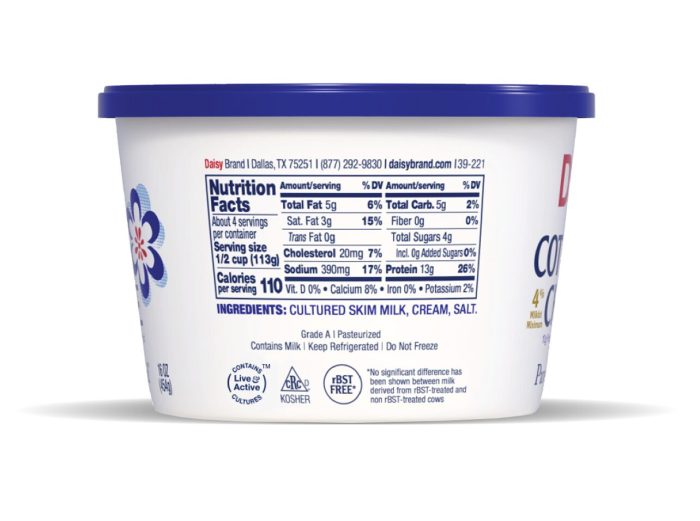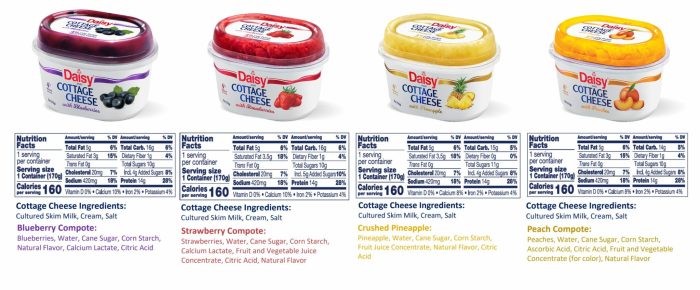Macronutrient Analysis of Daisy Cottage Cheese

Daisy cottage cheese nutrition facts – Yo, fam! Let’s break down the nutritional lowdown on Daisy Cottage Cheese, proper. We’re diving deep into the macronutrients – the big three: protein, fat, and carbs. Understanding these is key to knowing how this creamy treat fits into your diet.
Protein Content and its Effects
Daisy Cottage Cheese is a legit protein powerhouse. This protein is crucial for building and repairing muscle tissue, keeping you feeling full and satisfied, and generally keeping your bod in tip-top shape. The high protein content contributes significantly to satiety, meaning you’ll feel fuller for longer after eating it, which can be a game-changer for managing weight. Think of it as your body’s building blocks, essential for growth and repair.
A decent serving of Daisy Cottage Cheese can provide a significant chunk of your daily protein needs, especially useful if you’re hitting the gym hard or focusing on building muscle.
Fat Content and Health Implications
Now, let’s talk about the fats. Daisy Cottage Cheese contains both saturated and unsaturated fats. While saturated fats get a bad rap, they’re not all bad news. It’s all about balance. The unsaturated fats found in Daisy Cottage Cheese are generally considered healthier, contributing to heart health.
The total fat content is relatively moderate, so it’s not gonna clog your arteries, bruv. It’s worth noting that the type and amount of fat can vary slightly depending on the fat content of the milk used to make the cottage cheese.
Carbohydrate Content and Blood Sugar
The carb content in Daisy Cottage Cheese is relatively low. This is good news for those watching their blood sugar levels. The carbs present are primarily lactose, a type of sugar found in milk. Because of the low carb count and the protein’s impact on digestion, it doesn’t cause a massive spike in blood sugar levels like some other foods might.
This makes it a suitable option for individuals managing diabetes or following a low-carb diet, but always check the specific nutritional information on the packaging as variations exist.
Micronutrient Content and Health Benefits

Yo, so we’ve already broken down the macro stuff in Daisy Cottage Cheese – the protein, carbs, and fats. Now let’s get into the micro game – the vitamins and minerals that make this creamy delight a proper nutritional power-up. It’s not just about filling your belly, it’s about fuelling your body with the good stuff.
Daisy Cottage Cheese isn’t just a blank canvas for your taste buds; it’s packed with a bunch of essential micronutrients that contribute to your overall health and well-being. Think of it as a sneaky healthy snack that doesn’t compromise on flavour.
Key Micronutrients in Daisy Cottage Cheese
This ain’t your average snack, bruv. Daisy Cottage Cheese brings a solid lineup of vitamins and minerals to the table. These nutrients play crucial roles in various bodily functions, keeping you ticking over like a well-oiled machine.
Understanding the nutritional profile of daisy cottage cheese is crucial for balanced eating. Comparing its macronutrient content to other foods, such as the nutrition facts of grilled cheese , can help you make informed choices. This comparison highlights the differences in fat, protein, and carbohydrate content, allowing you to better tailor your diet to your individual needs and goals.
Returning to daisy cottage cheese, its high protein content makes it a valuable addition to a healthy meal plan.
- Riboflavin (Vitamin B2): Essential for energy production and healthy skin.
- Vitamin B12: Crucial for nerve function and red blood cell formation. A real lifesaver for those following a plant-based diet, where it’s often lacking.
- Calcium: The ultimate bone-building block. Keeps your bones strong and prevents osteoporosis.
- Phosphorus: Works hand-in-hand with calcium for strong bones and teeth. Think of it as calcium’s trusty sidekick.
- Selenium: An antioxidant that protects your cells from damage. Keeps your immune system on point.
Health Benefits of Daisy Cottage Cheese Consumption
Right, let’s talk about the real benefits. Eating Daisy Cottage Cheese regularly can seriously boost your health in several key areas.
Bone Health Benefits
The high calcium and phosphorus content makes Daisy Cottage Cheese a proper champion for bone health. Regular consumption contributes to stronger bones, reducing the risk of fractures and osteoporosis, especially important as we get older. Think of it as a preventative measure against brittle bones – a solid investment in your future self.
Gut Health Benefits
Daisy Cottage Cheese can contribute positively to gut health. The protein content helps maintain a healthy gut microbiome, while the probiotics naturally present in some varieties can further enhance digestive function. A happy gut means a happy you, innit?
Overall Well-being Benefits, Daisy cottage cheese nutrition facts
Beyond bones and guts, Daisy Cottage Cheese provides a decent dose of other essential nutrients. This contributes to overall well-being, supporting energy levels, immune function, and cognitive health. It’s a versatile and nutritious addition to a balanced diet – a proper all-rounder.
Considerations for Specific Dietary Needs
While Daisy Cottage Cheese is generally a good choice, it’s worth noting some potential drawbacks for individuals with certain dietary restrictions.
Lactose Intolerance
For those with lactose intolerance, Daisy Cottage Cheese might not be the best option, as it contains lactose. Lactose-free alternatives are available, though, so don’t get disheartened. Always check the label and choose wisely.
High Sodium Intake
Some varieties of Daisy Cottage Cheese can be higher in sodium than others. Individuals watching their sodium intake should carefully check nutrition labels and choose lower-sodium options. Keeping an eye on sodium is key for maintaining blood pressure levels.
Daisy Cottage Cheese in a Balanced Diet
Yo, fam! Let’s get real about fitting Daisy Cottage Cheese into your everyday grub. It’s not just a healthy snack; it’s a versatile protein powerhouse that can seriously level up your diet game. We’re talking balanced meals, creative recipes, and fitting it into different eating plans – all without sacrificing flavour.
Integrating Daisy Cottage Cheese into your diet isn’t about restrictive diets; it’s about smart choices that boost your overall health and well-being. Whether you’re aiming for weight loss, building muscle, or just eating cleaner, this creamy delight can be your secret weapon.
Sample Meal Plan Incorporating Daisy Cottage Cheese
This meal plan shows how easily Daisy Cottage Cheese can be slotted into a balanced day of eating. Remember, adjust portion sizes to your individual needs and calorie goals.
| Meal | Food Items | Daisy Cottage Cheese Role | Notes |
|---|---|---|---|
| Breakfast | 1/2 cup Daisy Cottage Cheese, 1/4 cup berries, 1/4 cup granola | Protein & Creamy Base | High protein start to the day, keeps you full. |
| Lunch | Large salad with mixed greens, grilled chicken, 1/2 cup Daisy Cottage Cheese, light vinaigrette | Protein Boost & Creamy Texture | Adds protein and a creamy element to a light lunch. |
| Dinner | Baked salmon, steamed broccoli, 1/4 cup Daisy Cottage Cheese mixed with herbs | Healthy Fat & Protein | Adds extra protein and healthy fats. |
| Snack | 1/2 cup Daisy Cottage Cheese with chopped apple and cinnamon | Protein & Satisfying Snack | Keeps hunger at bay between meals. |
Creative and Healthy Daisy Cottage Cheese Recipes
Daisy Cottage Cheese isn’t just for snacking; it’s a blank canvas for culinary creativity. These recipes prove it can be delicious and nutritious.
- Savoury Cottage Cheese Pancakes: Whisk together Daisy Cottage Cheese, an egg, some chopped chives, and a pinch of salt and pepper. Cook like mini pancakes in a non-stick pan. Serve with a dollop of salsa or avocado.
- Cottage Cheese & Veggie Fritters: Mix Daisy Cottage Cheese with grated carrot, zucchini, and a little flour. Form into small patties and pan-fry until golden brown. A great source of protein and fiber.
- Spicy Cottage Cheese Dip: Combine Daisy Cottage Cheese with chopped jalapeños, lime juice, cilantro, and a pinch of cumin. Serve with tortilla chips or crudités. A vibrant and flavourful snack.
Daisy Cottage Cheese in Various Dietary Approaches
Daisy Cottage Cheese is a serious contender for various dietary needs, making it a truly versatile food.
Weight Management: Its high protein content promotes satiety, helping you feel fuller for longer and potentially reducing overall calorie intake. The protein also supports muscle mass, which boosts metabolism.
High-Protein Diets: Daisy Cottage Cheese is a fantastic source of protein, making it a staple for those focusing on building muscle or increasing their protein intake. It’s low in fat compared to other protein sources, which is a bonus.
FAQ Insights: Daisy Cottage Cheese Nutrition Facts
Is Daisy Cottage Cheese good for weight loss?
The high protein content in cottage cheese can contribute to weight management by promoting satiety and helping you feel fuller for longer. Lower-fat varieties are ideal for those watching their calorie intake.
Does Daisy Cottage Cheese contain lactose?
Yes, Daisy Cottage Cheese contains lactose. Individuals with lactose intolerance should consume it in moderation or choose lactose-free alternatives if available.
Can I eat Daisy Cottage Cheese every day?
Moderation is key with any food. While Daisy Cottage Cheese is nutritious, incorporating it into a varied diet is recommended for optimal health.
How long does Daisy Cottage Cheese last in the fridge?
Always check the “best by” date on the package. Generally, an unopened container of Daisy Cottage Cheese will last for several weeks in the refrigerator.
